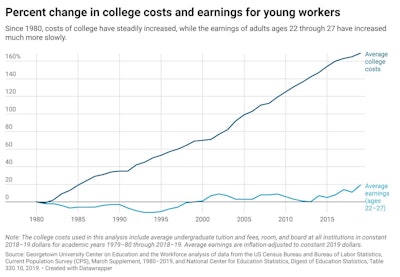“Postsecondary education policy has failed to keep higher education affordable even as formal education beyond high school has become more essential.”
That’s the conclusion of a new report from Georgetown University that shines a light on the growing gap between how much young workers make and how much they must pay to earn a college degree. Researchers analyzed data from the U.S. Census, Bureau of Labor Statistics and National Center for Education Statistics data from 1980 to 2019. The results show that the cost of college has increased by 169% over the past forty years, while earnings for workers ages 22 to 27 have only increased by 19%.
 This chart was featured in Georgetown's newest report, showing the exponentially increasing cost of college and the mostly stagnant rate of pay for young workers.
This chart was featured in Georgetown's newest report, showing the exponentially increasing cost of college and the mostly stagnant rate of pay for young workers.
“The evidence of our failure to help all youth make the long journey from early childhood to adult economic independence is plain,” reads the report. “In the trajectory from kindergarten to a good job, it is far better to be born rich and white than smart and poor in America.”
The report says that two out of three jobs in today’s world require some kind of post-secondary credential, “yet, while you people today need more education that ever to compete in the labor market, a college education is more expensive than in the past.”
Today’s college costs (tuition and fees, room and board, books, supplies, transportation, and other personal expenses) can range from $2,640 to $14,990 once scholarships and grants are considered. Without scholarships or grants, the price can range from $27,330 at a public in-state university to $55,800 at a private non-profit.
Researchers suggest addressing this issue by investing in early education, culturally responsive curriculum, and free college and career counseling for low-income students.



















